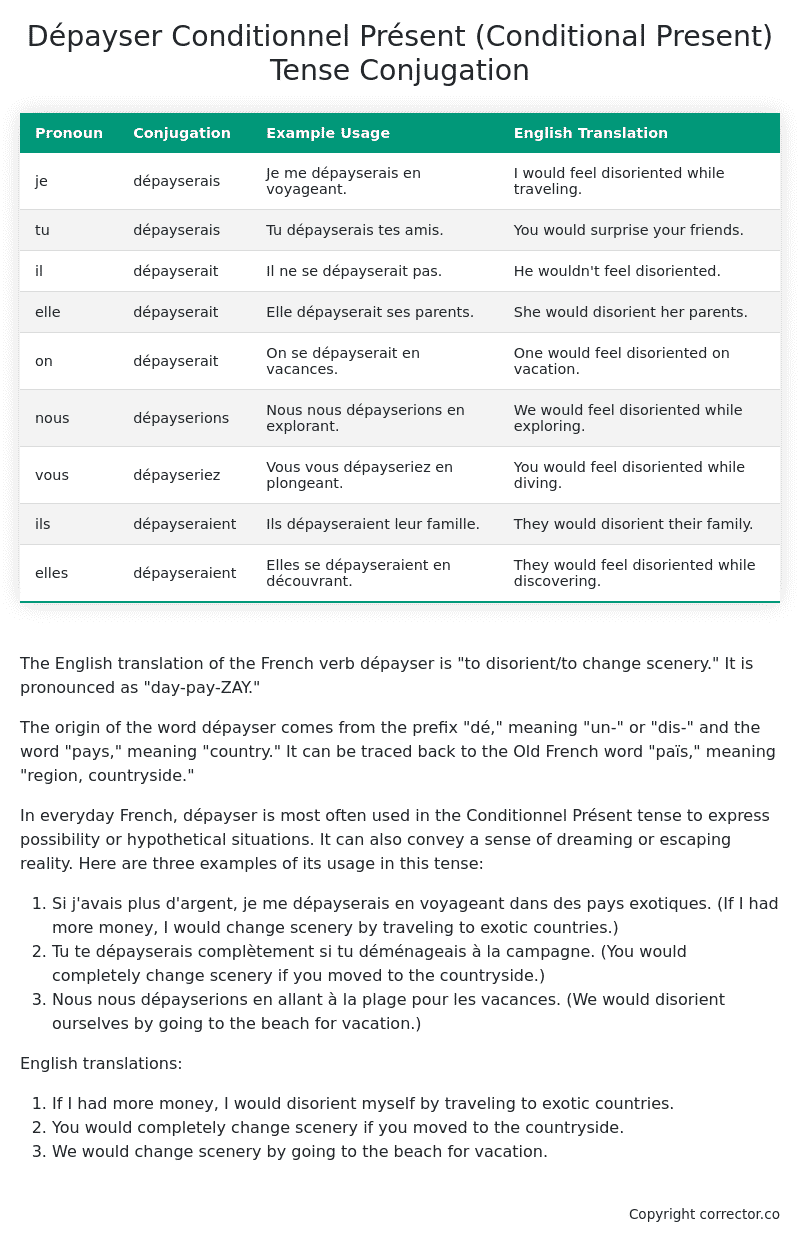Conditionnel Présent (Conditional Present) Tense Conjugation of the French Verb dépayser
Introduction to the verb dépayser
The English translation of the French verb dépayser is “to disorient/to change scenery.” It is pronounced as “day-pay-ZAY.”
The origin of the word dépayser comes from the prefix “dé,” meaning “un-” or “dis-” and the word “pays,” meaning “country.” It can be traced back to the Old French word “païs,” meaning “region, countryside.”
In everyday French, dépayser is most often used in the Conditionnel Présent tense to express possibility or hypothetical situations. It can also convey a sense of dreaming or escaping reality. Here are three examples of its usage in this tense:
- Si j’avais plus d’argent, je me dépayserais en voyageant dans des pays exotiques. (If I had more money, I would change scenery by traveling to exotic countries.)
- Tu te dépayserais complètement si tu déménageais à la campagne. (You would completely change scenery if you moved to the countryside.)
- Nous nous dépayserions en allant à la plage pour les vacances. (We would disorient ourselves by going to the beach for vacation.)
English translations:
- If I had more money, I would disorient myself by traveling to exotic countries.
- You would completely change scenery if you moved to the countryside.
- We would change scenery by going to the beach for vacation.
Table of the Conditionnel Présent (Conditional Present) Tense Conjugation of dépayser
| Pronoun | Conjugation | Example Usage | English Translation |
|---|---|---|---|
| je | dépayserais | Je me dépayserais en voyageant. | I would feel disoriented while traveling. |
| tu | dépayserais | Tu dépayserais tes amis. | You would surprise your friends. |
| il | dépayserait | Il ne se dépayserait pas. | He wouldn’t feel disoriented. |
| elle | dépayserait | Elle dépayserait ses parents. | She would disorient her parents. |
| on | dépayserait | On se dépayserait en vacances. | One would feel disoriented on vacation. |
| nous | dépayserions | Nous nous dépayserions en explorant. | We would feel disoriented while exploring. |
| vous | dépayseriez | Vous vous dépayseriez en plongeant. | You would feel disoriented while diving. |
| ils | dépayseraient | Ils dépayseraient leur famille. | They would disorient their family. |
| elles | dépayseraient | Elles se dépayseraient en découvrant. | They would feel disoriented while discovering. |
Other Conjugations for Dépayser.
Le Present (Present Tense) Conjugation of the French Verb dépayser
Imparfait (Imperfect) Tense Conjugation of the French Verb dépayser
Passé Simple (Simple Past) Tense Conjugation of the French Verb dépayser
Passé Composé (Present Perfect) Tense Conjugation of the French Verb dépayser
Futur Simple (Simple Future) Tense Conjugation of the French Verb dépayser
Futur Proche (Near Future) Tense Conjugation of the French Verb dépayser
Plus-que-parfait (Pluperfect) Tense Conjugation of the French Verb dépayser
Passé Antérieur (Past Anterior) Tense Conjugation of the French Verb dépayser
Futur Antérieur (Future Anterior) Tense Conjugation of the French Verb dépayser
Subjonctif Présent (Subjunctive Present) Tense Conjugation of the French Verb dépayser
Subjonctif Passé (Subjunctive Past) Tense Conjugation of the French Verb dépayser
Subjonctif Imparfait (Subjunctive Imperfect) Tense Conjugation of the French Verb dépayser
Subjonctif Plus-que-parfait (Subjunctive Pluperfect) Tense Conjugation of the French Verb dépayser
Conditionnel Présent (Conditional Present) Tense Conjugation of the French Verb dépayser (this article)
Conditionnel Passé (Conditional Past) Tense Conjugation of the French Verb dépayser
L’impératif Présent (Imperative Present) Tense Conjugation of the French Verb dépayser
L’infinitif Présent (Infinitive Present) Tense Conjugation of the French Verb dépayser
Struggling with French verbs or the language in general? Why not use our free French Grammar Checker – no registration required!
Get a FREE Download Study Sheet of this Conjugation 🔥
Simply right click the image below, click “save image” and get your free reference for the dépayser Conditionnel Présent tense conjugation!

Dépayser – About the French Conditionnel Présent (Conditional Present) Tense
Formation
Common Everyday Usage Patterns
Expressing Polite Requests
Expressing Hypothetical Situations
Expressing Doubt or Uncertainty
Interactions with Other Tenses
Present Tense
Past Tense
Future Tense
Conditional Perfect
Summary
Want More?
I hope you enjoyed this article on the verb dépayser. Still in a learning mood? Check out another TOTALLY random French verb conjugation!


